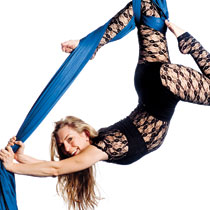 |
 |
||||||||||||||
 |
| Photo: Kelvin Ma |
Big Top Scholars
Jumbo isn’t the only member of the Tufts community with a circus arts résumé. The current crop of graduate students includes a whole range of seasoned performers.
Students of child development are especially well represented, and they’re convinced that circus arts have real-world value. Take Jen Agans, ELIOT-PEARSON14, who started her circus training as a child in an alternative school. She notes that the work requires true discipline, and that getting through it develops confidence. Kids stumble, feel like quitting, and keep on practicing anyway, knowing that the result will be worth it. “I think that is a life skill, honestly,” she says. And Christina Zagarino, ELIOT-PEARSON12, a child fitness advocate with expertise in scarf juggling, points to another advantage. She’s observed that kids in circus camp often spend five days a week, eight hours a day exercising—and loving it. “This is great,” she remembers thinking. “Why isn’t everyone doing circus arts right now?”
In her day job, Tracy McAskill, G10, explores the nexus of theoretical and experimental physics. Then in her off-hours, she’s a contortionist, astounding audiences with surreal triumphs of flexibility. Either way, she pushes the boundaries of what’s possible.
One day, after teaching a class in trapeze at a school for the deaf, it occurred to Suzanne Rappaport, BSOT13, then a performer with Circus Smirkus, that trapeze could be used as therapy. Since coming to Tufts, she’s only grown more sure of it.
Jeremy Warren, ELIOT-PEARSON13, counts knife juggling, fire eating, and sticking nails into his face among his skills. He believes that the circus, with its free-spirited celebration of the unconventional, could help kids’ emotional development.